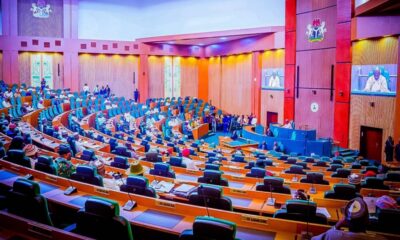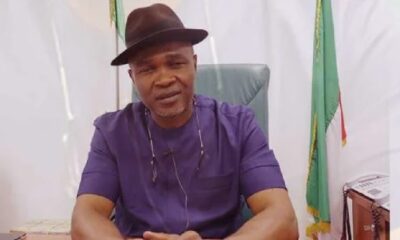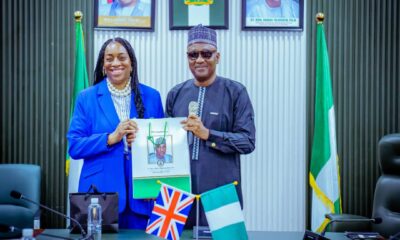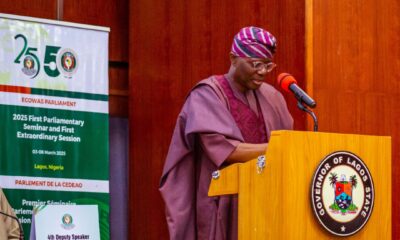News
Shift to Parliamentary system of govt: We’re advocating for an homegrown system that’ll benefit all Nigerians-Rep Chinda+Video
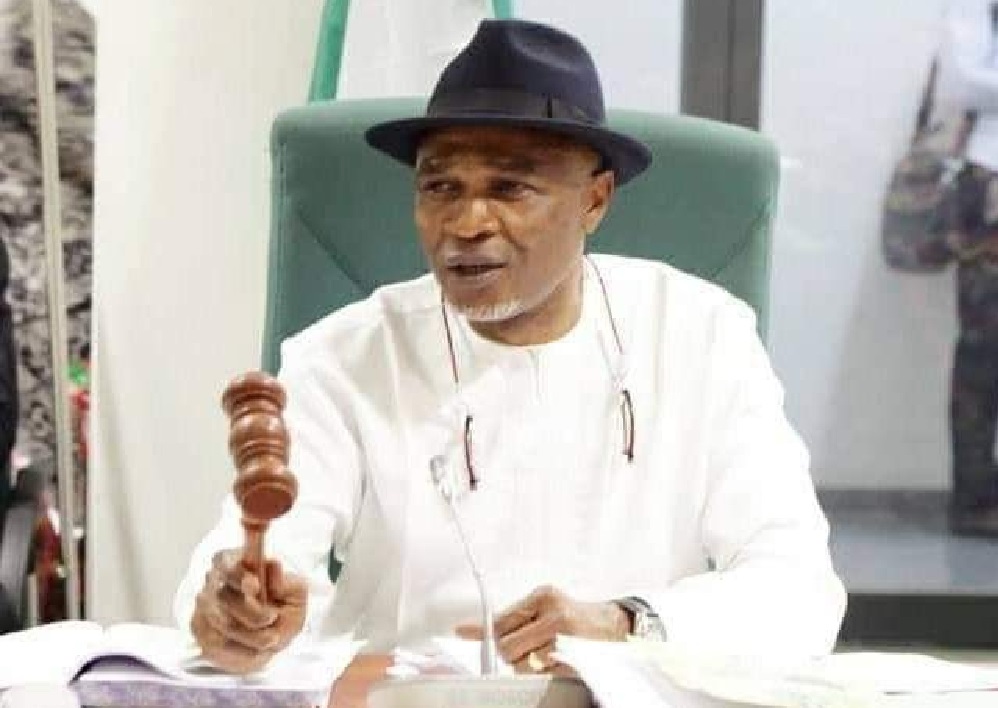
By Gloria Akiba
…says we’ve studied all the demerits and merits of our past parliamentary system
…insists cost of governance will be drastically reduced if we have our own model govt
…the situation now is motion without movement
One of the advocates of a shift from Presidential to Parliamentary system of government in Nigeria, the minority parties caucus leader, Rep Kingsley Chinda has said what is being proposed is an home grown system of government that will benefit all Nigerians from all walks of life.
The Rivers born federal lawmaker representing Obio/Akpor federal Constituency made this disclosure in an interactive session with fellow proponents at the weekend in Abuja.
Hear him:
On recent reactions against the proposed shift by 2031, Chinda said:
“I am one of the strong proponents of the shift from presidential to a homegrown parliamentary system of government.
“Now, yes, we have listened to some criticisms, particularly that of Governor Fashola, who is of the opinion that we should tell Nigerians why the first republic failed and that should be the starting point.
“But I want to assure you that we are not building castles in the air. We took our time to look at the system of government, to look at the problems within the polity, and how, as parliamentarians, we can assist in resolving some of these problems through legislative intervention.
“And then we felt that the entire system that we are practicing is skewed towards failure, one, considering our background, our experiences, our diversity, which, of course, should be an advantage to us.
“And then if you look at the places where systems of government are copied from, they consider their culture, they consider their beliefs; they consider their society in adopting a system of government.
But in Nigeria, we either copy from the United Kingdom or we copy from the United States, without recourse to our background. And that is why we are asking for a homegrown system of government.
“But because we don’t have, perhaps, the proper word to describe it, what we envision is closer to a parliamentary system. And so today, we are asking that we amend our constitution to introduce a homegrown parliamentary system of government.
Now, what led to the failure of the First Republic, whether we had studied it? I will answer Governor Fashola by saying, yes, we have studied it. We have studied deeply the First Republic, the conduct, the successes, and the failure.
“And in doing that, we have even moved to Kano to meet with the only surviving member of the First Republic, Alhaji Dandata and we asked him this question directly. Why did it fail?
And some of his responses were, one, that during the First Republic, many of them were not very well informed as to the system, the rudiments, and the practice. And so to him, that one of the reasons why the parliamentary system failed was ignorance.
“Two, our various tribes and religion and belief in them and then the individual attitude of politicians of that day, which is still in place till today, concerning the issues of power and exercise of power and abuse of discretion.
“And then the constitutional provision that has to do with the sharing of power between the centre and the region. That all these culminated, mainly the power tussle and struggle, culminated into the crisis we had in the South West, which led to the failure of the First Republic.
“And so having heard this, we have also taken into consideration these issues and that’s why we keep saying that it would be wrong for you to introduce a system of government without taking cognizance of your background, where you’re coming from.
“I give you an example. Ask a Nigerian public office holder to exercise discretion today on an issue. He will be influenced by either religion or tribe. Very few public officers in Nigeria will exercise discretion with a neutral background, dispassionately.
“Now, the same public officer, if he is a Briton, asks him to exercise the same discretion, or an American, most often they will look at the nation first in exercising that discretion, most often.
So because we have this inherent issue, it will be difficult for us to import laws that have to do with discretion and bring them hook, line, and sinker to Nigeria and expect it to succeed. It will not succeed.
“We must tweak it to consider our peculiar background. And that’s why we say the time has come for us to move forward.
We’re talking about cost of governance, and government after government has been making attempts to take care of that, either by merging agencies of government or by slashing allowances and salaries of public office holders. How far has that taken us?
“As far as we are concerned, it’s motion without movement. We’re still at the same spot. And so we must do something fundamental if we want to move forward.
And what is that? We have an unwieldy government that is too large for us as a nation to make progress.
“You have the Office of the President and the Office of the Vice President. You have the Office of the Senate President and Deputy Senate President. You have the Speaker and Deputy Speaker. These offices, all of them, come with different budgets.
“You have 360 members of National Assembly. You have the senators. You go down to the states, the same. You have Executive arm, very large.
I can tell you as a parliamentarian today that, well we can decide to say 50% of the salary of every member of parliament will be saved. That will not change much in terms of cost of governance in the country.
“But if we have a situation which we are proposing, commencing from the local government, we try it and see the problems and the successes. If we succeed at the local government level, we move to the next stage, to the state.
And as we are doing this, we will make consequential amendments to relevant laws and then end up at the national. You elect Legislators. There will be no election for the Executive. First, you have saved so much money.
“You can calculate how much we spend on presidential, governorship, and council chairmanship elections.
Now, amongst the councilors, they will elect a chairman and perhaps an assistant, the deputy chairman, amongst themselves. The implication is that any ward that is sending anybody as a councilor will send a chairmanship material as a councilor, unlike what we have today.
“Anybody that is sending any member to the National Assembly will send a member that has the capacity to be the prime minister of the country.
And so you cut down one, number of elections, cost of election, which is the foundation first.
And if you go into governance, as we propose that we have a prime minister who will be the head of the government and a president from Senate who will be ceremonial head.
“What it means is that as a prime minister, you earn the salary of a parliamentarian that you elected as, and you only have perhaps the allowance to function in the office of the prime minister.
Accountability and stewardship is one big problem in our country today, not just corruption.
“You have a situation where different arms of government, the Parliament and the Executive, will appear not to be on the same trajectory. We don’t even know what the other arm is doing.
Recent example, the issues of Central Bank movement to Lagos, Parliamentarians who are not fully informed and aware of the need for that government policy.
“If you have the minister in Parliament and you have a prime minister that will brief the parliament at least every week or once a month, every Parliamentarian will be part and knowledgeable in government policies.
“And then it will be easier and faster for government policies to be executed. It will be less expensive.
When it comes to issues of accountability, we still felt that, look, our laws today, the Nigerian constitution, can allow you exercise discretions that are not morally correct but legally correct. It’s not unlawful, but morally it is wrong.
You have a situation where our president can govern this country for four years without talking to Nigerians. And there is no constitutional provision against that.
“And that’s why in the last government you had the Garba Shehu talking to us. Today you have Ngelale talking to Nigerians. Even during the COVID era, this country was virtually begging her president to address her.
“Other nations hear from their president every month, some weekly. We were begging for it. That is the laws that we have, the system of government that we have.
“And yet people say the Nigerian president is about the most powerful in the world because of the type of presidential system that we are practicing.
Even the American system that we have copied from, you are aware that the Vice President of the United States is the President of the Senate. So why do we have all these offices?
“We spend so much on them. And then we at the same time say that we want to cut down the cost of governance.
Look at our budget. What percentage do we have for capital projects? And what percentage do we have for recurrent? It’s difficult for us to make progress.
“Yes, as difficult as it might appear, as new as it will sound, we think that if we are serious minded, we should be ready to make the sacrifice and leave our comfort zone for the country to make progress.
And that’s why we believe that the time has come for us to start considering a homegrown parliamentary system of government that will suit our country without looking at what others practice outside because the circumstances are not exactly the same.
“So in answer to that question, whether we have considered the reasons why the First Republic failed, yes, we have. And we still believe that a homegrown parliamentary system is the best for us as it stands today.
But we have to take it grade by grade, step by step, from the lowest until we get to the presidential level.
On former President Olusegun Obasanjo’s advocacy for Afro democracy, Chinda said: Obasanjo agreed with us that the current presidential system will not help us much.
And so he is calling for Afro-Democracy, that is African democracy and it is still the same idea, the same ideology that we are proposing.
“What President Obasanjo is saying is that we need an African-grown democratic system that will put into consideration the African culture, the African circumstance, African condition.
But for us, charity begins at home. And that was what we exactly told him. We believe in the Afro-democracy, yes, but charity begins at home.
In that Afro-democracy, we need a Nigerian-grown democratic system.
” And so whilst he is looking at it from the African perspective, perhaps because of his level, he’s no longer a Nigerian leader, he’s an African leader, he’s a universal leader. So he could look at it from that perspective.
“We are representing Nigerians. We are bringing it down home. So we are on the same note, because when we had an interaction with him, we understood ourselves.
And we told him that for us, as parliamentarians of Nigeria, let us start from Nigeria. And then if it works, no doubt other African countries will want to copy. Their system might not be exactly the same with the Nigerian system, but it should be a home-grown democratic system.
On whether the homegrown system has capacity to pull down corruption, he said: “No doubt, it’s not going to be a magic wand that once you introduce it, all the ills of society will be gone. But then it is a better system to check corruption compared with what we have presently.
Now I give you an example. The issues where you have ministers, permanent secretaries, members run after them on oversight function, every now and then, and then you get little or no result.
What is the whole idea of oversight function? You need to monitor expenditure to ensure that monies budgeted are used for the purpose. If you have them amongst you, accountability is higher. It is easier to check them. They know that they are there every week.
“And so again, one of the criticisms that people talk about is that it will lead to instability of government. But if the society is better, there is stronger check. And I tell you that it will also not lead to instability because the whole fear of instability is that it is easy to remove the prime minister.
“The prime minister should do the writing and he will not be removed. And so if you find a prime minister that is corrupt, he knows that it is easy to remove him, unlike the situation we have now.
You can be corrupt and still remain in your office. Nigerians can criticize, Nigerians can complain, but they cannot do much to remove you.
“But this system is self-cleansing. It doesn’t take much to remove you if you are corrupt. And so that will make people in public office to sit up.
And it’s a system that will be a hands-on for all public office holders. It’s not going to be a place for retirement and all that, you know people who are tired, you want some rest, you come up here and from here you can retire. It’s not going to be that kind of place.
Asked whether the proponents have verified documents of past republis, Chinda affirmed saying: “Yes, we have also looked at the copies of the constitution or the laws that were used in the First Republic. There are some, if you look at the conference report, which is very comprehensive, there are some of those laws that you need to reintroduce, but you’re not going to bring back the entire constitution. It will not work.
“There are some laws in our current constitution that are still valid. That’s why I said that over time we’ll be having consequential amendments of our laws. So some laws will go, some new ones will come. Some of the old laws that are fit for purpose could also come in and you tweak them to consider our local circumstance.
News
SAD! Popular Broadcast Journalist Bukola Agbakaizu Slumps, Dies Before Afternoon Shift

The Ogun State media industry was plunged into mourning on Monday following the sudden death of veteran broadcast journalist, Mrs. Bukola Agbakaizu, a longtime staff member of Ogun State Television (OGTV).
Agbakaizu, aged 52, reportedly collapsed while preparing for her afternoon shift at the OGTV studios in Abeokuta. Despite immediate efforts to revive her, she was pronounced dead upon arrival at the Federal Medical Centre, Abeokuta.
Her passing was officially confirmed on Tuesday night in a statement issued by the Secretary of the Nigeria Union of Journalists (NUJ), Ogun State Council, Mr. Bunmi Adigun.
“Bukola Agbakaizu, a dedicated staff member of OGTV, tragically slumped while preparing for her shift. She was rushed to the hospital but could not be saved,” Adigun stated.
He described her as a passionate and highly respected journalist who had previously served as Vice Chairman of the OGTV Chapel and was a valued member of the Wale Olanrewaju-led executive of the NUJ Ogun State Council.
“She was a vibrant and committed media professional. Her death leaves a painful void in our community,” Adigun added.
Agbakaizu also served as an ex-officio member of the NUJ Ogun State Council. She is survived by her two children, her elderly mother, colleagues, and a wide circle of friends in the journalism community.
The Nigeria Association of Women Journalists (NAWOJ), Ogun State Chapter, also expressed profound sorrow over her untimely demise, noting her contributions to the advancement of women in journalism.
News
Just in: NNPC Cuts Petrol Price Amid Competitive Moves with Dangote Refinery

By Kayode Sanni-Arewa
The Nigerian National Petroleum Company (NNPC) Limited has announced a reduction in the pump price of Premium Motor Spirit (PMS), popularly known as petrol, at its retail outlets in the Federal Capital Territory (FCT), Abuja.
According to a report by The Cable, the petrol price at the NNPC station in Wuse Zone 3, Abuja, was cut from ₦935 per litre to ₦910, signaling a slight relief for consumers in the nation’s capital.
However, the new pricing has not yet extended to Lagos, where petrol prices at NNPC retail outlets remain unchanged. This discrepancy has sparked renewed concerns over regional price variations in Nigeria’s downstream oil market.
The latest adjustment comes in the wake of an intensifying price contest between NNPC and the privately-owned Dangote Refinery. Just days earlier, on May 12, the Dangote Refinery lowered its ex-depot petrol price to ₦825 per litre, a strategic move aimed at capturing a larger share of the domestic fuel market.
The price reduction appears to be an outcome of recent high-level discussions between NNPC’s Group Chief Executive Officer (GCEO), Bayo Ojulari, and Dangote Refinery’s founder, Aliko Dangote. The meeting, held on May 9, reportedly sought to realign the relationship between the two entities and promote collaboration rather than rivalry.
Speaking after the meeting, Dangote stated, “There is no competition between us; we are not here to compete with NNPC Ltd. NNPC is part and parcel of our business, and we are also part of NNPC. This is an era of cooperation between the two organisations.”
Ojulari echoed this position during a press briefing on May 12, attributing the petrol price reduction to the recent procurement of fuel at lower international prices. He explained that the earlier surge in pump prices was due to existing stock purchased by marketers at higher rates.
“This downward price adjustment reflects our effort to respond to changing supply conditions and deliver better value to Nigerians,” Ojulari said, while also noting that more adjustments may occur as the market stabilizes.
Industry observers view the ongoing price adjustments as an early indicator of growing competition in Nigeria’s petroleum sector, especially with the Dangote Refinery ramping up its operations. Analysts believe that sustained collaboration between both players could enhance supply efficiency and potentially ease the burden of fuel costs for consumers nationwide.
News
BUNKERING: Army, Tantita Security Arrest Truck Laden with Illegally Extracted Crude Oil in Delta

A joint team comprising officers of the 181 Battalion, Nigerian Army, Oleh, and personnel from Tantita Security Services Nigeria Ltd. has arrested a vacuum truck involved in illegal crude oil extraction at Well 3, Olomoro, in Isoko South Local Government Area of Delta State.
According to reports, the truck, which previously belonged to Engr. Daniel Omoyibo, also known as Damotech, was gifted to the driver, Mr. Matthew Ojomikre, who is currently being detained at the Forward Operating Base (FOB), 181 Battalion, Oleh.
Upon interrogation, the driver confessed that his company had been contracted by Heritage Energy Operational Services Ltd. to evacuate sludge from Well 3, Olomoro. However, he was unable to provide any formal approvals or documentation authorizing the activity, as was previously the norm.
Until recently, Heritage Energy Operational Services Ltd. had consistently provided crude and condensate trucking permits to officers of the Nigerian Army and Tantita Security Services Nigeria Ltd. for proper monitoring from the loading point to the discharge location.
Officers of Tantita Security Services, in collaboration with a team from Heritage and the Nigerian Army, have collected samples from the vacuum truck for laboratory testing and analysis.
The preliminary confessional statement from the driver indicates that he illegally collected crude oil from Well 3 under the pretense of evacuating sludge from the wellheads.
Authorities have reported that the same truck has previously been involved in unauthorized crude oil evacuations within the Isoko axis.
The driver, the truck, and its contents remain in custody at the 181 Battalion Base in Oleh for further interrogation and possible prosecution.

-

 News22 hours ago
News22 hours agoJust in: Another major headache as 3 PDP senators defect to APC
-

 News22 hours ago
News22 hours agoCourt Jails Two Six Months for Naira Abuse in Lagos
-

 News23 hours ago
News23 hours agoUnion seals Lagos company over racial discrimination of workers
-

 News22 hours ago
News22 hours ago$1.43m scam: Ajudua on the run as Supreme Court orders his return to prison
-

 News23 hours ago
News23 hours agoCBN warns public against fraudsters claiming to act on its behalf
-

 Economy6 hours ago
Economy6 hours agoCBN launches new platform, targets $1bn monthly diaspora remittances
-

 News6 hours ago
News6 hours agoKano varsity shuts female hostel over immorality
-
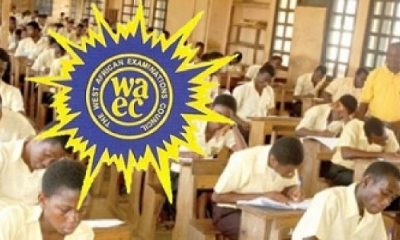
 News20 hours ago
News20 hours ago10 WAEC students still missing as Rivers women demand Sole Administrator’s intervention




